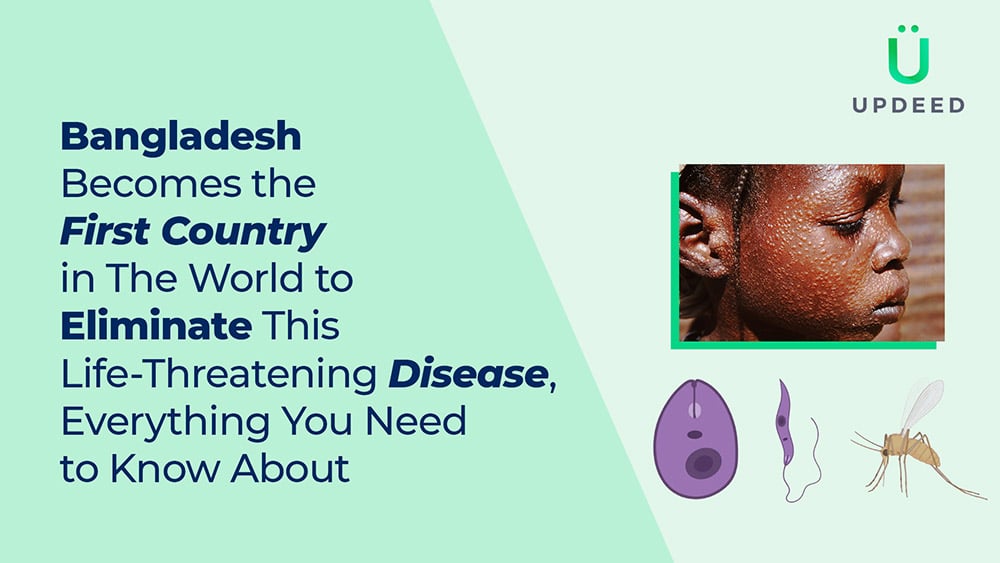Bangladesh Becomes the First Country in The World to Eliminate This Life-Threatening Disease, Everything You Need to Know About
“I salute the great progress made by Bangladesh, in line with WHO guidance, in eliminating……….as a public health threat” – said Tedros Adhanom Ghebreyesus, WHO Director-General.
But what for?
In an extraordinary feat, Bangladesh has etched its name in the annals of global public health history as the first country to officially eliminate visceral leishmaniasis, commonly known as kala-azar, as a public health problem.
This groundbreaking achievement is the culmination of relentless dedication and collaborative efforts by the Government of Bangladesh, the World Health Organization (WHO), and a consortium of partners, marking a historic milestone in the global battle against neglected tropical diseases.

Visceral leishmaniasis, the most severe form of leishmaniasis, is a life-threatening disease caused by parasites transmitted through infected sandflies. Primarily affecting impoverished rural communities, the disease brings with it a slew of risk factors, including poverty, inadequate housing, malnutrition, and other infectious diseases. Symptoms include fever, weight loss, and organ enlargement, with a staggering fatality rate of over 95% if left untreated.
The WHO officially validated Bangladesh’s achievement based on reported cases of visceral leishmaniasis consistently remaining below 1 per 10,000 population in each subdistrict for a remarkable three consecutive years. This rigorous standard underscores the sustained and effective efforts in the country’s battle against this debilitating disease.
Years of fighting
Since the launch of the Regional Kala-azar Elimination Initiative in 2005, a collaborative effort between Bangladesh, India, and Nepal, substantial progress has been made. A strategic framework, initially published in 2005 and updated in 2012 and 2022, emphasized early diagnosis, comprehensive case management, integrated vector control, disease surveillance, and social mobilization.
These strategies formed the backbone of Bangladesh’s successful campaign against kala-azar.
Research and development initiatives, supported by organizations such as the Special Programme for Research and Training in Tropical Diseases (TDR) and WHO, introduced innovative tools and improved treatment options. Notably, the donation of liposomal amphotericin B (AmBisome) by Gilead Sciences, Inc., since 2013, has been pivotal in accelerating the elimination program in the Southeast Asia Region.
In the words of Dr. Tedros Adhanom Ghebreyesus, WHO Director-General, “Neglected tropical diseases like visceral leishmaniasis require continued national leadership, commitment, and collaborative action by countries and health partners worldwide.”
“I salute the great progress made by Bangladesh, in line with WHO guidance, in eliminating visceral leishmaniasis as a public health threat,” he added.
Bangladesh’s accomplishment goes beyond the elimination of kala-azar. Earlier this year, the country was also validated for eliminating lymphatic filariasis as a public health problem, showcasing a double triumph in the fight against neglected tropical diseases.
As part of its post-validation efforts, Bangladesh now focuses on effective surveillance to maintain its hard-won status. This achievement, however, comes at a critical juncture, considering the global distribution of visceral leishmaniasis remains a significant concern, with cases reported in various geographical areas, including East Africa.
With this historic milestone, Bangladesh sets a precedent in the global effort to eliminate neglected tropical diseases, inspiring hope that other nations can follow suit. The collaborative model adopted by Bangladesh, involving various stakeholders and international partners, serves as a testament to the power of united efforts in the face of formidable public health challenges.
Ready to make a positive impact in the world?
UPDEED is the place for you. Our free and open platform is filled with inspiring stories from individuals and organizations who are making a difference in their communities and beyond. Connect and collaborate with like-minded individuals from around the globe on UPDEED, and discover your own potential to create meaningful change. Join our community and make a difference.





